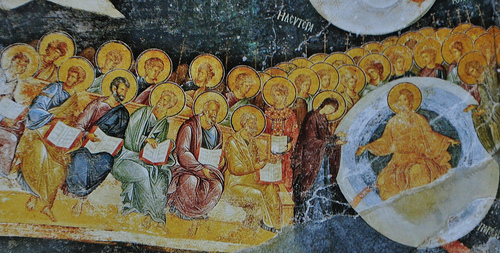St. John Cassian (d. 435) meditating on the Gospel saw anger arising within us as a great threat to our salvation as it cuts us off from loving God or neighbor. Additionally for St. John it is not a matter only if we vent our rage. He says we need to cut off such anger in our hearts before we ever act on it. Our hearts must become pure. Just controlling outward expressions and behavior is not enough to purify our hearts. St. John’s words are an interpretation of what St. Paul advises: “Be angry but do not sin; do not let the sun go down on your anger, and give no opportunity to the devil”(Ephesians 4:26-27). For Cassian, the only way to prevent anger from becoming sin is to deal with it in your heart before you are tempted to express it.
“Hence, if we desire to obtain in its entirety that divine prize of which it is said: ‘Blessed are the pure of heart, for they shall see God,’ this must not only be cut off from our actions but must even be uprooted from the depths of our soul. For a wrathful anger that has been checked in speech and that has not manifested itself in deeds is of no value whatsoever if God, from whom the secrets of the heart are not concealed, sees that it exists in the recesses of our breast. For the words of the Gospel command that the roots of our vices be cut off rather than the fruits, which will certainly never grow anymore once the shoot has been pulled up. And when they have been pulled up not from the surface of our deeds and actions but from the depths of our thoughts, our mind will then be able to abide in utter patience and holiness. And therefore, in order for murder not to be perpetrated, anger and hatred are cut off; without them the crime of murder can never be committed.

The Fathers in general allowed that the passions in themselves were not evil. Even anger can serve a righteous purpose. The ability to become angry itself was given to us by God to serve a good purpose. Anger can sometimes motivate us to resist evil and sin. However, as experience shows, anger often is vented without any wisdom. When expressed in an uncontrolled fashion it becomes destructive and we use it to excuse whatever behavior we engage in. So anger in itself may not always be sin, but neither does it always lead to righteousness. It can be a scourge that sets off a series of angry responses in others – a chain reaction not of righteousness but of sinful passion which leads to further anger and sin. St. John Cassian continues:
For ‘whoever is angry with his brother shall be liable to judgement.’ And: ‘Whoever hates his brother is a murderer.’In that he desires, namely, to kill him in his heart, even though other human beings have not seen him shed his blood with his own hand or weapon, the Lord, who renders each person a reward or punishment not only for his accomplished deeds but even for his desires and intentions, declares him a murderer on account of his angry disposition. As he himself says through the prophet: ‘Their works and their thoughts I am coming to gather together with all nations and tongues.’ And again: ‘Their thoughts within them accusing or defending them, on the day when God will judge the secrets of men.’ […] Hence it behooves the athlete of Christ, who is contending lawfully, to root out the movements of wrath. The perfect medicine for this diseases is that we realize, first, that in no way are we permitted to get angry, whether for an unjust or a just cause, knowing that we shall at once lose the light of discretion and firm and correct counsel, as well as goodness itself and the restraints of righteousness, if the guiding principle of our heart is obscured by darkness; and then, that the purity of our mind will soon be driven out and that it can never become a temple of the Holy Spirit as long as the spirit of wrath dwells in us.

Perhaps part of the Desert Father thinking on anger is that anger which continually abides in the heart will prevent us from ever having a pure heart. We have to rid ourselves of being possessed by anger and seeing life through the lens of anger. ‘
Anger may occur in our hearts in reaction to something we experience, but then that anger has to be harnessed by wisdom, humility and love to become an energy that inspires us to the good.
If we are simply “an angry person”, no one else will ever see any righteousness in our anger. Only when we are a person of peace, will we ourselves be able to experience our anger as a righteous reaction to evil. Only then will we be able to use the energy of anger to deal with sin.
Lastly, we should understand that we are never allowed to pray or make petition to God when we are angry. Above all, we should keep before our eyes the uncertain state of our human condition, daily realizing that we shall depart from our bodies and that our chaste abstinence, the renunciation of all our property, the contempt of wealth, and the toil of fasting and keeping vigil will confer nothing on us if eternal punishment is being readied for us by the Judge of all on account of wrath and hatred alone.” (THE INSTITUTES, pp 203-204)

If we see evil, anger can be a right reaction to it. But then, we have to cast the anger aside in order to pray to God for the wisdom, humility and love needed to know how to act. Cassian warns that a prayer said in anger and hatred which asks for the destruction of another will only result in our being judged by God. Anger can energize to act in the face of evil, but then we cannot let that same anger control our lives, but rather have to rid ourselves of personal wrath in order to turn to and trust in God.
Repay no one evil for evil. Have regard for good things in the sight of all men.If it is possible, as much as depends on you, live peaceably with all men.Beloved, do not avenge yourselves, but rather give place to wrath; for it is written, “Vengeance is Mine, I will repay,”* says the Lord.Therefore
“If your enemy is hungry, feed him;
If he is thirsty, give him a drink;
For in so doing you will heap coals of fire on his head.”*
Do not be overcome by evil, but overcome evil with good.
(Romans 12:17-21)
Beloved, do not imitate what is evil, but what is good. (3 John :11)





